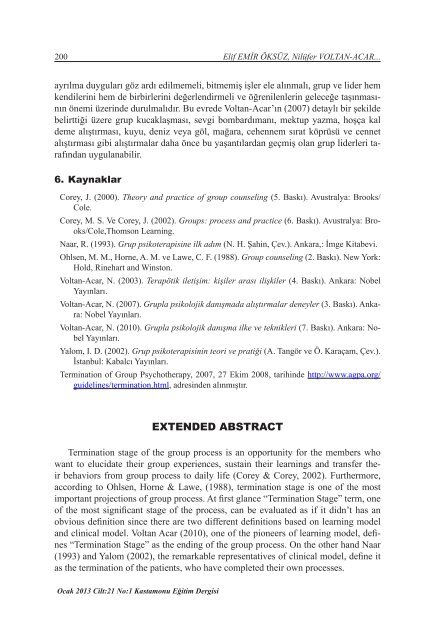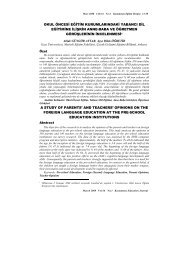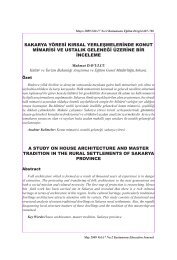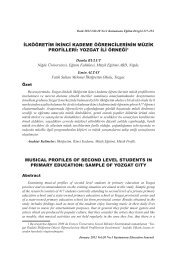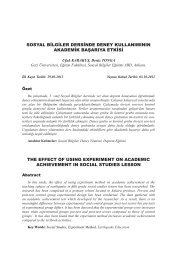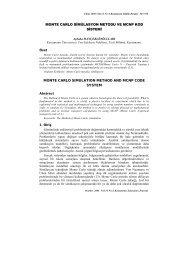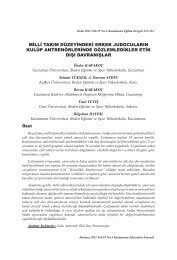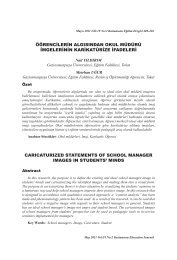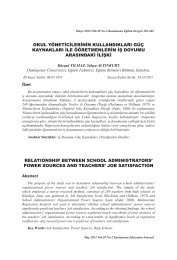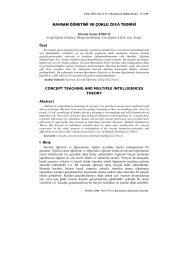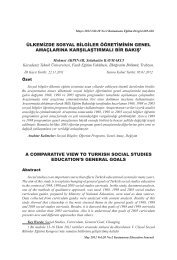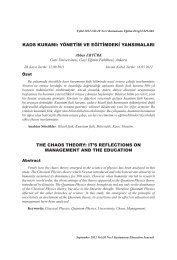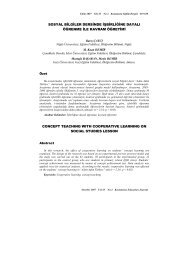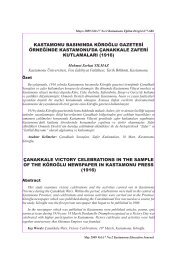Grupla Psikolojik Danışma Sürecinde Sonlandırma Evresi
Grupla Psikolojik Danışma Sürecinde Sonlandırma Evresi
Grupla Psikolojik Danışma Sürecinde Sonlandırma Evresi
Create successful ePaper yourself
Turn your PDF publications into a flip-book with our unique Google optimized e-Paper software.
200<br />
Elif EMİR ÖKSÜZ, Nilüfer VOLTAN-ACAR...<br />
ayrılma duyguları göz ardı edilmemeli, bitmemiş işler ele alınmalı, grup ve lider hem<br />
kendilerini hem de birbirlerini değerlendirmeli ve öğrenilenlerin geleceğe taşınmasının<br />
önemi üzerinde durulmalıdır. Bu evrede Voltan-Acar’ın (2007) detaylı bir şekilde<br />
belirttiği üzere grup kucaklaşması, sevgi bombardımanı, mektup yazma, hoşça kal<br />
deme alıştırması, kuyu, deniz veya göl, mağara, cehennem sırat köprüsü ve cennet<br />
alıştırması gibi alıştırmalar daha önce bu yaşantılardan geçmiş olan grup liderleri tarafından<br />
uygulanabilir.<br />
6. Kaynaklar<br />
Corey, J. (2000). Theory and practice of group counseling (5. Baskı). Avustralya: Brooks/<br />
Cole.<br />
Corey, M. S. Ve Corey, J. (2002). Groups: process and practice (6. Baskı). Avustralya: Brooks/Cole,Thomson<br />
Learning.<br />
Naar, R. (1993). Grup psikoterapisine ilk adım (N. H. Şahin, Çev.). Ankara,: İmge Kitabevi.<br />
Ohlsen, M. M., Horne, A. M. ve Lawe, C. F. (1988). Group counseling (2. Baskı). New York:<br />
Hold, Rinehart and Winston.<br />
Voltan-Acar, N. (2003). Terapötik iletişim: kişiler arası ilişkiler (4. Baskı). Ankara: Nobel<br />
Yayınları.<br />
Voltan-Acar, N. (2007). <strong>Grupla</strong> psikolojik danışmada alıştırmalar deneyler (3. Baskı). Ankara:<br />
Nobel Yayınları.<br />
Voltan-Acar, N. (2010). <strong>Grupla</strong> psikolojik danışma ilke ve teknikleri (7. Baskı). Ankara: Nobel<br />
Yayınları.<br />
Yalom, I. D. (2002). Grup psikoterapisinin teori ve pratiği (A. Tangör ve Ö. Karaçam, Çev.).<br />
İstanbul: Kabalcı Yayınları.<br />
Termination of Group Psychotherapy, 2007, 27 Ekim 2008, tarihinde http://www.agpa.org/<br />
guidelines/termination.html, adresinden alınmıştır.<br />
EXTENDED ABSTRACT<br />
Termination stage of the group process is an opportunity for the members who<br />
want to elucidate their group experiences, sustain their learnings and transfer their<br />
behaviors from group process to daily life (Corey & Corey, 2002). Furthermore,<br />
according to Ohlsen, Horne & Lawe, (1988), termination stage is one of the most<br />
important projections of group process. At first glance “Termination Stage” term, one<br />
of the most significant stage of the process, can be evaluated as if it didn’t has an<br />
obvious definition since there are two different definitions based on learning model<br />
and clinical model. Voltan Acar (2010), one of the pioneers of learning model, defines<br />
“Termination Stage” as the ending of the group process. On the other hand Naar<br />
(1993) and Yalom (2002), the remarkable representatives of clinical model, define it<br />
as the termination of the patients, who have completed their own processes.<br />
Ocak 2013 Cilt:21 No:1 Kastamonu Eğitim Dergisi


